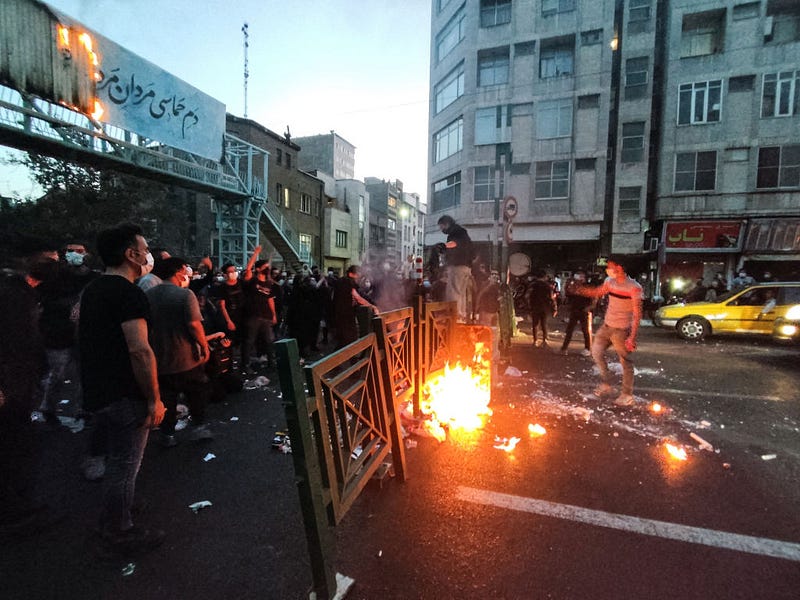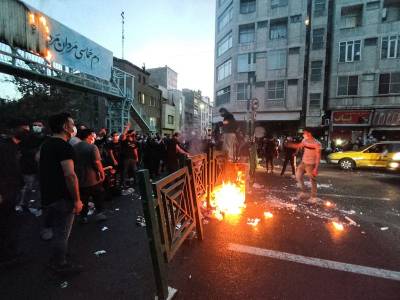Few world leaders gathered this week for the United Nations General Assembly (UNGA) appeared as isolated as Iranian President Ebrahim Raisi. As he delivered predictable anti-American attacks from the podium, Iranians were risking life and limb to protest the Islamic Republic at home. While the Biden administration’s approach to Iran has featured one too many pulled punches, the recent protests offer an opportunity to recalibrate.
The latest round of protests were sparked by the Iranian government’s killing of a woman named Mahsa Amini. The 22-year-old had been detained and beaten by Iran’s morality police—which enforce strict Islamic social norms—over alleged violations of the country’s hijab laws. She was pronounced dead at Tehran’s Kasra hospital last week.
Iranian authorities alleged that Amini had a pre-existing health condition, a dubious explanation rejected by her family and broad swaths of Iranian society. Amini’s death touched off days of protests and acts of defiance across the country. Media reports suggest the regime has killed dozens of people already, and that number is expected to rise. Authorities have again resorted to using internet blackouts to mask the regime’s repression and impede protesters. This is not the first time in recent years that demonstrators have moved from demanding reform to openly seeking revolution.
Yet officials from the Iranian government were welcomed to New York this week, as clear a symbol of the Biden administration’s Iran policy incoherence as any. Raisi sits at the helm of the most sanctioned cabinet in Iranian history. Raisi and his chief of staff are subject to U.S. and EU sanctions, yet both were granted visas to New York.
It’s too late to undo this embarrassment, but it’s still possible for the administration to live up to its promise of a human-rights–centric foreign policy. More specifically, Biden and other top national security officials can act on their stated desire to stand with demonstrating Iranians and hold “accountable” those involved in Amini’s death or repressing protests.
We have previously recommended in these pages what amounts to a “maximum pressure” against the Islamic Republic—and one of “maximum support” to the Iranian people. This includes walking away from negotiations to revive the 2015 Iran nuclear deal, implementing a “protest policy playbook” to support Iranians who are demonstrating, and isolating the government at international organizations. But there are actions short of these broader steps that can be taken immediately.
The administration currently has all the legal and political authorities necessary to engage in a targeted campaign of designations against those responsible for killing Amini, as well as those cracking down on protesters across Iran.
The administration can work with the Treasury Department to sanction persons and entities who engage in human rights violations or censorship activities, pursuant to executive orders 13553 and 13846. These orders target persons and entities who engage in human rights violations or censorship activities including but not limited to penalizing freedom of expression and assembly, respectively. Put simply, these penalties put offenders on America’s economic blacklist through an asset freeze.
There is also a route for diplomatic pressure. The State Department, under Section 7031(c) of the Department of State, Foreign Operations, and Related Programs Appropriations Act of 2021, can levy a visa ban against foreign government officials and their families for gross rights violations. Children and families of regime elites live extravagant lives abroad. The reason for such a ban was best made by popular retired Iranian footballer Ali Karimi, who tweeted in the aftermath of the killing of Mahsa Amini that, “Their children leave. Our children die.”
On Thursday, the Biden administration drew on some of these authorities to target Iran’s morality police, which is a component of the already sanctioned law-enforcement forces (LEF). The administration also appears to have issued a string of designations against officials who have supported cracking down on protesters in jurisdictions witnessing demonstrations.
Individuals that the administration recently designated include the Tehran and national chiefs for the morality police, Haj Ahmad Mirzaei and Mohammad Rostami. The administration also sanctioned four security officials at the national level including but not limited to the head of the Iranian Army’s Ground Forces as well as the Minister of Intelligence. But there are more targets that the administration can and should consider.
Following the logic of local designations, additional provincial law enforcement chiefs could be subject to sanctions due to the use of force against protesters. Two prominent examples include Hossein Rahimi and Ali Azadi, who serve as chief of police for Tehran and Kurdistan. And while LEF chief Hossein Ashtari is already sanctioned, he could be subject to the aforementioned 2021 law to ensure a visa ban against him and his family. The same could apply for Ashtari’s deputy, Qasem Rezaei, in addition to all the other senior security officials designated this week.
Scaling down, the administration could even target LEF commanders of smaller cities witnessing protests and violent repression. Potential candidates could include the commanders of the LEF in Divandarreh, Saqqez, Babol, and Bokan, who are Col. Abbas Abdi, Col. Seyyed Ali Saffari, and Col. Mohammad Zaman Shalikar and Colonel Salman Heydari, respectively. In Bokan for instance, a 10-year-old girl was shot in the head. Washington could also explore the potential applicability of sanctions against local political officials, who are likely to retain ties to LEF units in their jurisdiction such as governors. In Saqqez for instance, protests took place outside of governor Kamil Karimian’s office.
Scaling up, the administration could study the feasibility of sanctioning national level political officials, such General Ahmad Vahidi, who serves as minister of interior, and Issa Zarepour, who serves as minister of information and communications technology. The Treasury Department previously sanctioned Vahidi’s predecessor for control over the LEF, and has already sanctioned Vahidi but not under human rights authorities. Vahidi also has an INTERPOL red notice against him for his role in the bombing of the AMIA Jewish cultural center in Argentina in 1994. Now would be a prudent time to update Vahidi’s designation.
Treasury previously sanctioned Zarepour’s predecessor for internet censorship and throttling internet access, particularly after the Aban or November 2019 protests. Given that the Islamic Republic continues to engage in this activity, Treasury should update its sanctions lists by targeting the next person in charge of continuing internet censorship in Iran.
We aren’t delusional about the chances of this happening, but it would be logical to apply sanctions against Iran’s supreme leader himself, Ali Khamenei. Sitting atop the regime, Khamenei is the ultimate arbiter of Iran’s security policy at home and abroad. He also serves as the country’s commander in chief.
While sanctioned under Executive Order 13876, which targets his office and network of appointees, Khamenei has not been subject to any human rights penalties. This is despite his reported authorization of the violent crackdown in 2019 that led to the death of about 1,500 Iranians. “The Islamic Republic is in danger. Do whatever it takes to end it. You have my order,” is what one source quoting Khamenei told Reuters in December 2019. It’s likely that Khamenei continues to be involved in, or at least made abreast of, regime responses to protests of a similar scale against the Islamic Republic.
The Biden administration faces a simple question: Does it have the political will to act in a sustained manner against Iran’s human rights abuses and repression of protests? Or will the recent string of designations be yet another one-off?
Behnam Ben Taleblu is a senior fellow at the Foundation for Defense of Democracies (FDD) where Saeed Ghasseminejad is a senior adviser. Both contribute to FDD’s Iran Program and Center on Economic and Financial Power (CEFP), among others. The views expressed are their own.






Please note that we at The Dispatch hold ourselves, our work, and our commenters to a higher standard than other places on the internet. We welcome comments that foster genuine debate or discussion—including comments critical of us or our work—but responses that include ad hominem attacks on fellow Dispatch members or are intended to stoke fear and anger may be moderated.
With your membership, you only have the ability to comment on The Morning Dispatch articles. Consider upgrading to join the conversation everywhere.